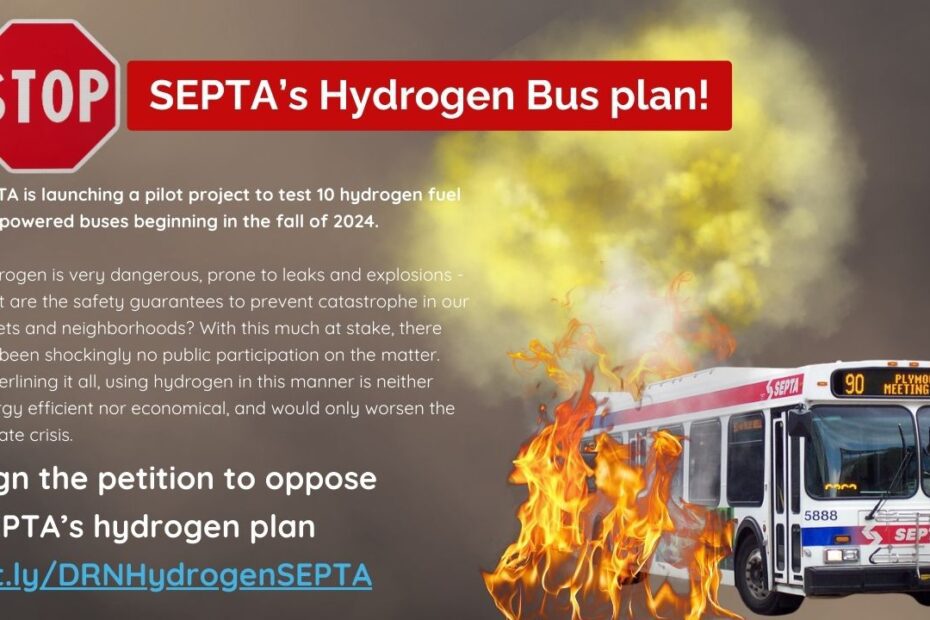Proposed hydrogen bus fleet threatens public health and safety, fuels climate crisis
Background
A dangerous hydrogen project is being launched in Philadelphia. The Southeastern Pennsylvania Transportation Authority (SEPTA) plans to deploy a hydrogen bus fleet to use for public transport in the Greater Philadelphia Region. They are starting with a pilot project using 10 hydrogen fuel cell powered buses beginning in the fall of 2024, testing through to the fall of 2025. They will also test 10 battery-powered electric buses. They will then decide which technology to proceed with, either hydrogen fuel cell or fully electric buses or both. The pilot program will operate out of the Midvale bus depot located at 2401 Roberts Ave. in Philadelphia.
SEPTA is a partner in the proposed MACH2 Hydrogen Hub and plans to become an “end user” of the hydrogen that MACH2 would produce. For now, SEPTA will buy its hydrogen from PLUG Power, a private company that will truck frozen liquid hydrogen each day from Tennessee or some other undisclosed location. At the Midvale bus depot, the liquid hydrogen will be stored and then warmed to a compressed gas that feeds the fuel cells to power the bus. While in use, the fuel cells will be carried in canisters on the roofs of the buses. If they decide to move ahead, SEPTA’s plans are to convert its bus fleet to hydrogen, storing and fueling buses at six of their eight bus depots; the buses will operate throughout SEPTA’s service area.
There has been no public participation process that has engaged the public in this project; SEPTA decided to start the pilot without any hearings or opportunity for people to have input into their decision. People are unaware of the dangers they will be exposed to because SEPTA has not informed or asked for input from those who would be impacted, keeping the public in the dark. This lacks agency transparency.
Why should our communities be informed?
HIGHLY DANGEROUS: Hydrogen gas is highly flammable and potentially explosive, very dangerous to handle, transport, and store, exposing residents and workers to catastrophic risk should there be a release to the air. SEPTA has not published safety protocols demonstrating how it, which has no experience handling hydrogen, will be capable of providing required protection.
NOT SAFE IN POPULATED AREAS: Trucks delivering highly volatile liquid hydrogen would travel up to ~800 miles to Philadelphia and snake through the City’s streets, jeopardizing the safety of neighborhoods and infrastructure. At build out, a minimum of 47 tank trucks per week would be required and the hydrogen would be stored, then evaporated to a gas, and delivered as a high-pressure gas to each bus every day. The dense populations along the truck routes, around the terminals, and the commuter and worker proximity to the project’s infrastructure is not compatible with hydrogen fuel.
LEAKS: Hydrogen leaks approximately three times faster than natural gas and five times faster than propane on a volumetric basis. Fires and explosions have occurred in various components of hydrogen systems as a result of leaks that can quickly meet a variety of ignition sources, bursting into fire that burns so hot it can’t be put out, or causing a powerful explosion. Leaks also result in emissions that will increase the climate crisis because hydrogen is an indirect greenhouse gas.
INEFFICIENT AND UNPROVEN: Hydrogen fuel cell powered transportation is not proving to be competitive with battery powered electric vehicles in terms of efficiency, performance, and affordability. It is also very new and unproven as a technology. Especially at this proposed scale.
HUGELY EXPENSIVE: SEPTA’s estimated cost of just the installation the hydrogen infrastructure is between $6.5 million to $16.1 million at each of the six depots.

